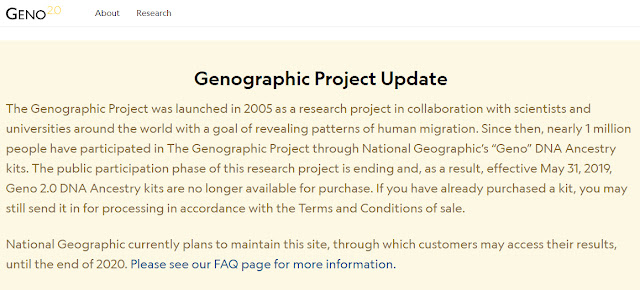The Genographic Project has provided a detailed set of FAQs:
As of today's date, the Genographic Project has sold 997,222 kits in 140 countries.
There are no doubt many kits still waiting to be returned and it's possible that the project will eventually pass the one million milestone.
This was an
almost inevitable development after Rupert Murdoch bought out the media arm of the National Geographic and ended its not-for-profit status. The new for-profit arm was re-named as National Geographic Partners and was went into partnership with Disney in March this year. The National Geographic Society continues to operate as a non-profit organisation.
The Genographic Project was not without controversy. See for example the essay The brave new era of human genetics by Hans-Jurgen Bandelt, Yong-Gang Yao, Martin Richards and Antonio Salas published in 2008. The Native American researcher Kim Tallbear published a critique Narratives of race and indigeneity in the Genographic Project in 2007. Many population geneticists were critical of the fancy Y-DNA and mtDNA haplogroup stories provided as customer reports. Ancient DNA testing has now shown that we cannot use the DNA of living people to make inferences about past populations.
However, many genealogists first discovered the joys of genetic genealogy by testing at the Genographic Project. After transferring their DNA results to FamilyTreeDNA many people were then inspired to start their own surname projects, haplogroup projects and geographical projects.
The Genographic Project collected DNA from nearly 100,000 people from indigenous populations around the world. I understand they were waiting for the costs of whole genome sequencing to come down before starting to analyse all the data. This is a valuable resource and the scientific research will continue so we can look forward to many more interesting publications.
Anyone who has tested at the Genographic Project can transfer their data to the FamilyTreeDNA database:
https://web.archive.org/web/20180523205436/https://www.familytreedna.com/landing/nat-geo-transfer.aspx#/verify (Retrieved from the Wayback Machine. Transfers no longer accepted)
Note,
however, that Helix kits, which were sold exclusively in the US, cannot be
transferred.
Genographic transfers will have the kit number prefixed by the letter N. Judging by the kit numbers in my projects at FTDNA, well over 200,000 people have already transferred their Genographic results to FTDNA.
When transferring to FamilyTreeDNA you need to be aware that if you participate in relative matching the company is now automatically opting all customers into Law Enforcement Matching. This means that DNA profiles uploaded by law enforcement agencies in the US and their representatives can access your name, your e-mail address and the amount of DNA you share with the the law enforcement kits. Law enforcement matching is not restricted to US citizens but applies to the entire database regardless of country of residence. If you wish to opt out of Law Enforcement Matching you can do so from the Privacy and Sharing Page. If you wish to understand more about these issues you can read my article for Forensic Science International on Using genetic genealogy databases in missing persons cases and to develop suspect leads in violent crimes.
With thanks to Mats Ahlgren and Paul R Smith in the ISOGG Facebook group. See also Paul's blog post National Geographic Geno Project DNA ending.Further reading
Genographic Project prepares to shut down consumer database by Roberta Estes, DNAeXplained


No comments:
Post a Comment